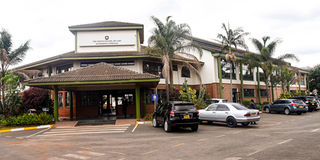Questions on law students who have failed bar exams for over 15 years

The Kenya School of Law academics complex in Nairobi.
Data from the Council of Legal Education (CLE) shows that students have been failing the bar exam for the past 15 years, raising questions about their chances of ever being admitted to the bar.
To qualify as a high court advocate, students must pass all nine units offered during the 12-month course at the Kenya School of Law (KSL) located in Nairobi's Karen area.
One qualifies for admission to KSL after graduating with a Bachelor of Laws (LL.B) degree from a university offering the programme.
The results of the March 2023 Bar Examination, which were printed on June 13, 2023, and posted on the CLE website, show that students who were admitted to KSL in 2008 and 2009 will continue to retake their exams for the longest time among the cohorts admitted to the school until they are deemed qualified.
This means that they cannot practise law or provide legal consultancy until they pass the bar exam.
However, they can be employed as company secretaries. Although the bar exam is set by CLE and administered by KSL, it is marked by a different set of professionals - judicial officers, including judges, practising lawyers, officers from the Attorney General's Office, the Office of the Director of Public Prosecutions (ODPP), law lecturers and accountants.
"If you fail one, some or all of the nine papers, it means that you have to retake each of the papers within five years from the first date of administration," says a CLE official who did not wish to speak on the record.
Admitted to KSL in 2008
The official noted that if the five years elapse before you achieve this, you have to start the entire course again, an indication that there are candidates who have resat the entire course three times, which is a cumulative 15 years, assuming they were first admitted to KSL in 2008.
To qualify for admission to the bar, a candidate must achieve a pass mark of 50 percent or above in all nine subjects offered and must also pass an oral examination and a written project in all subjects.
When taking the exam for the first time, the oral exam accounts for 20 percent of what is required to achieve the 50 percent or above mark, and the project accounts for a further 20 per cent.
The written examination at the end of the 12-month postgraduate course accounts for 60 percent of the total marks.
In theory, therefore, a candidate who scores all marks in the oral examination and the project needs only 10 per cent to achieve the 50 percent pass mark.
In addition to these requirements, a trainee advocate must also complete a six-month supervised pupillage with an advocate who has been practising for at least six years after being admitted to the bar in Kenya.
Deputy Speaker of the National Assembly Gladys Shollei has faulted KSL's administration of the exams, noting that the school was never meant to be a training ground for students.
Pay Sh145,000
“KSL was meant to deal with the ethics in the profession. This includes how lawyers behave while in court, the manner of handling clients and their accounts among others,” Ms Shollei, who is also the Uasin Gishu Woman Representative, said.
Students joining KSL have to pay Sh145,000 for admission and Sh45,000 in examination fees for all the nine units they have to take within 12 months.
Those who fail are charged Sh10,000 for each paper they fail, meaning that if you fail all nine units, you will have to pay Sh90,000 before you are allowed to retake the exam.
Bringing in other schools to conduct the bar exam was one of the proposed amendments to the law that never saw the light of day.
The proposed amendment to the law was to remove the monopoly of KSL as the sole authority to conduct the bar exam.
It has also been observed that a large number of students who resit exams after a long time tend to fail consistently in certain subjects.
The most common subjects failed by re-sitters are Probate or Administration, Conveyancing and Commercial Transactions.
Of the 126 candidates who resat in March, only 36 passed, giving a pass rate of 28.57 per cent.
Some 243 sat the Conveyancing paper, of which only 9 passed, a dismal pass rate of 3.7 per cent.
And the pass rate for the Commercial Transactions paper was 48.13 per cent out of 482 candidates.
In the past, Civil Litigation has seen mass failures at the first sitting and most who re-sit the paper tend to fail once or twice, but there was a marked improvement in performance in the March exam, with 366 candidates passing out of 423 who sat, representing a pass rate of 86.95 percent.
March 2023 exam
The Professional Ethics paper has traditionally been one of the highest-scoring papers in the Bar exam, with over 90 per cent of candidates passing at the first attempt.
In the March 2023 exam, some 1,281 candidates sat the exam and 1,218 passed, giving a pass rate of 95.08 per cent, which compares favourably with a similar pass rate of 95.13 per cent for those who sat the Civil Litigation exam on their first attempt in March.
However, a fraction of candidates still fail the Ethics exam at the first attempt, and most don't pass at the second or third attempt.
In the March resit, 10 candidates were examined and 5 failed.
This means that despite the small number of candidates resitting the ethics exam, 50 percent failed to score 50 per cent or above.





